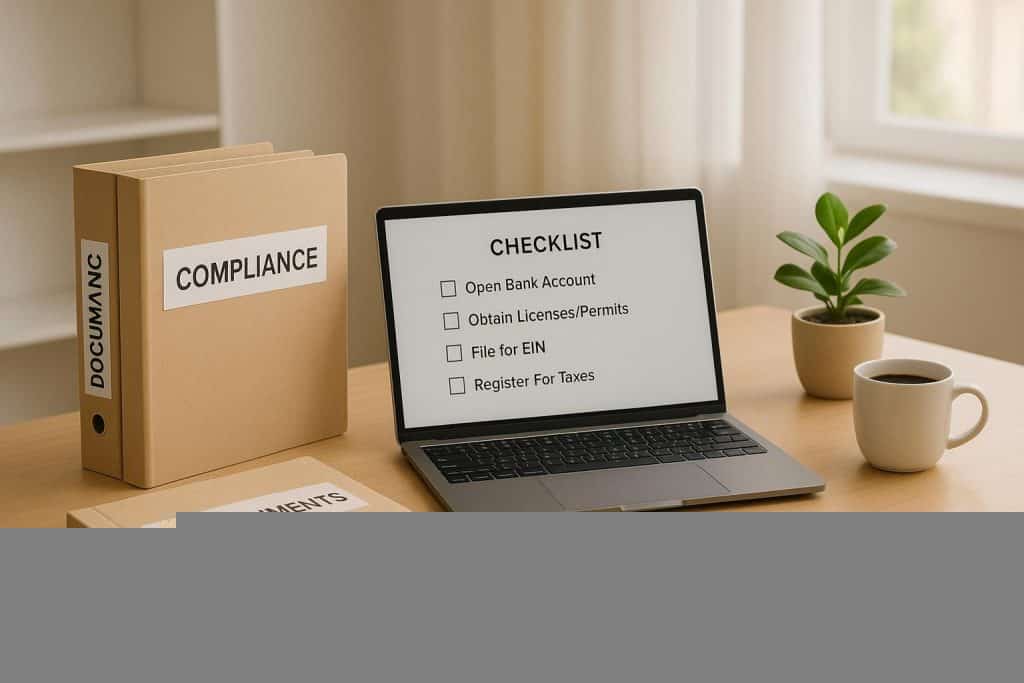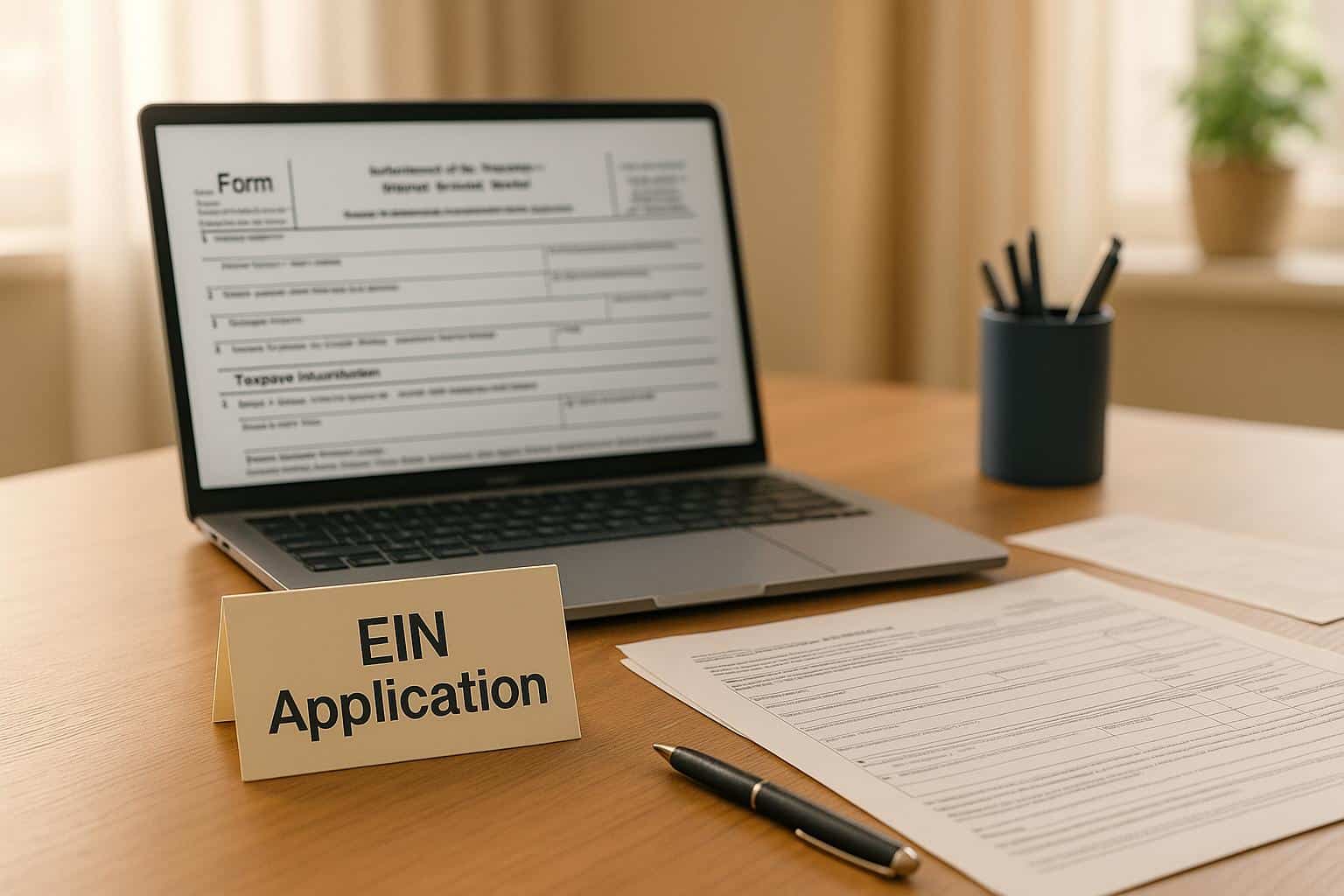Forming an LLC is just the beginning. Here’s what you need to do next to stay compliant and protect your business:
- Organize Key Documents
- LLC Formation Certificate (Articles of Organization)
- Operating Agreement
- Employer Identification Number (EIN)
- Set Up Business Operations
- Open a business bank account (keep personal and business finances separate).
- Get required licenses and permits based on your industry and location.
- Choose a registered agent for legal correspondence.
- Meet State Filing Requirements
- File annual or biennial reports as required.
- Fulfill state tax obligations (e.g., franchise tax, sales tax).
- Maintain Accurate Records
- Track financial records (bank statements, transactions, distributions).
- Document business decisions (meeting minutes, resolutions).
- Update records for any LLC changes (address, ownership, etc.).
- Manage Tax Responsibilities
- Understand your LLC’s tax classification (sole proprietorship, partnership, S or C Corporation).
- Meet federal and state tax deadlines (annual returns, estimated taxes, sales tax).
Pro Tip: Use tools like compliance calendars or software to stay on top of deadlines and streamline your processes. Staying organized helps you avoid penalties and keeps your LLC in good standing.
Required LLC Documentation
Gathering the right legal documents is essential for setting up your LLC. These documents form the foundation for your business’s legal and operational structure.
LLC Formation Certificate
The LLC Formation Certificate, sometimes called Articles of Organization depending on the state, is an official document issued by the state to confirm your LLC’s legal status. This certificate typically includes:
- The name of your LLC and the date it was formed
- The primary business address
- Information about your registered agent
- The management structure of the LLC
- Details about members or managers
Keep both digital and physical copies of this document, as you’ll need it to verify your LLC for various purposes.
LLC Operating Agreement
The Operating Agreement is an internal document that outlines how your LLC functions. While not required in every state, it’s highly recommended to have one. It usually covers:
- Ownership shares and voting rights
- How profits and losses are divided
- Member roles and responsibilities
- Decision-making processes
- Rules for adding or removing members
- Steps for dissolving the LLC
Having a clear Operating Agreement helps define ownership roles and ensures smoother management, keeping personal and business assets separate.
EIN Registration
The Employer Identification Number (EIN) is a nine-digit number issued by the IRS, serving as your LLC’s federal tax ID. It’s necessary for:
- Filing federal taxes
- Opening a business bank account
- Hiring employees
- Building business credit
- Managing transactions with vendors and contractors
You can apply for an EIN for free on the IRS website. Make sure to store it safely, as you’ll need it for tax filings, banking, and employee-related tasks.
Business Setup Steps
Once you have your LLC documents in hand, it’s time to establish the core operations of your business.
Setting Up a Business Bank Account
Creating a separate business bank account is crucial for protecting your LLC’s liability. To open one, you’ll generally need:
- Your Formation Certificate
- EIN (Employer Identification Number)
- Operating Agreement
- Two forms of ID for each member
- An initial deposit
Look for a bank that offers perks like free business checking, mobile deposit, accounting software integration, debit card access, and merchant services. These features can simplify your financial management.
Don’t forget to confirm your local business licenses and permits next.
Acquiring Business Licenses and Permits
The specific licenses and permits your LLC needs will vary based on your industry and location. Some common examples include:
- General Business License
- Professional License (for specialized industries)
- Health Department Permit
- Sales Tax Permit
- Zoning Permit
Costs and renewal requirements depend on your local jurisdiction. Check with your city or county authorities to ensure compliance with state regulations. Many areas now make it easier by offering online portals for applications and renewals.
Choosing a Registered Agent
Your registered agent must have a physical address in your state, be available during regular business hours, and promptly forward any legal documents. While you can act as your own registered agent, many business owners opt for professional services to simplify compliance and maintain privacy.
For added convenience, consider platforms that combine registered agent services with other business management tools to keep everything organized.
Once these foundational steps are complete, you can move on to meeting your state filing requirements.
State Filing Requirements
Stay on top of state-level compliance to keep your LLC in good standing.
State Report Requirements
Many states require LLCs to submit annual or biennial reports to ensure state records are accurate. These reports usually include:
- Current business address and contact information
- Details about members or managers
- Description of principal business activities
- Registered agent details
- Financial statements (if required)
Each state has its own rules, so make sure to follow the specific guidelines. Missing deadlines can lead to penalties or even the dissolution of your LLC. Once you’ve handled reporting, focus on your state tax responsibilities.
State Tax Obligations
Your LLC may need to address several types of taxes, including:
- Franchise Tax: Some states charge an annual franchise tax, even if your LLC doesn’t turn a profit. Be aware of any minimum tax amounts your state requires.
- Sales Tax: If your LLC sells physical products or certain taxable services, you may need to register for a sales tax permit, collect applicable taxes, and file returns regularly.
- Income Tax: Filing requirements depend on how your LLC is classified for tax purposes. For example, single-member LLCs often report income on personal tax returns, while multi-member LLCs or those taxed as corporations have different filing procedures.
To ensure compliance, consult a tax professional or use state-provided resources for guidance.
Filing Deadline Schedule
Keeping track of deadlines is essential. Create a filing calendar to stay organized throughout the year:
- Initial Quarter (January–March)
- Review tax updates
- Gather data for reports
- Prepare sales tax documentation
- Second Quarter (April–June)
- File quarterly taxes
- Submit annual reports
- Conduct a mid-year compliance review
- Third Quarter (July–September)
- Submit quarterly taxes
- Update business details
- Check license and permit renewal dates
- Fourth Quarter (October–December)
- File final quarterly taxes
- Prepare year-end filings
- Plan next year’s compliance schedule
Using tools like a digital compliance calendar or specialized software can help you stay ahead of deadlines. Being proactive ensures your LLC remains in good standing with state authorities.
Record Keeping Rules
Keeping accurate records is crucial for staying compliant with the law and ensuring smooth business operations. It also helps protect your limited liability status and makes tax preparation much easier.
Financial Records Management
Organize and track your LLC’s financial activities carefully. Key items to maintain include:
- Bank statements and reconciliations
- Transaction records with receipts or other supporting documents
- Member capital contributions
- Distribution records
- Annual financial statements, such as balance sheets, income statements, and cash flow reports
Using trusted accounting software can help you back up data consistently and retrieve it when needed.
Business Decision Records
It’s important to document key decisions and activities within your LLC. This includes:
- Meeting Records: Keep track of the date, time, and location of meetings, along with attendees, voting results, and decisions made.
- Member Resolutions: Record decisions about ownership changes, updates to the operating agreement, significant debt, or changes to the business location.
- Operating Agreement Updates: Document amendments, member approvals, and maintain version control to track changes over time.
Business Change Documentation
When your LLC undergoes changes, it’s essential to document them properly. Common changes include:
- Address updates
- Registered agent changes
- Adding or removing members/managers
- Business name updates
- Tax classification changes
Follow these steps to record changes effectively:
- Note the details of the change and its effective date.
- Update relevant LLC documents.
- Notify the state as required.
- Inform business partners.
- Update internal systems to reflect the changes.
sbb-itb-ba0a4be
Tax Filing Requirements
Understanding your LLC’s tax obligations is crucial for staying compliant and avoiding penalties. Your responsibilities depend on your tax classification and the nature of your business activities.
LLC Tax Status Options
The tax treatment of your LLC varies based on its structure:
- Sole Proprietorship/Disregarded Entity: For single-member LLCs, income and expenses are reported on Schedule C of your personal tax return (Form 1040).
- Partnership: Multi-member LLCs are taxed as partnerships, with each member reporting their share of profits and losses on their individual returns.
- C Corporation: The LLC itself pays corporate tax rates and files Form 1120.
- S Corporation: Profits pass through to shareholders, requiring the filing of Form 1120S.
To change your LLC’s tax classification, you’ll need to file Form 8832 (for C corporation status) or Form 2553 (for S corporation status) with the IRS.
Tax Due Dates
Here are the key tax deadlines to keep in mind:
| Tax Obligation | Due Date | Who Must File |
|---|---|---|
| Annual Tax Return (Partnership/S-Corp) | March 15 | Multi-member LLCs, S Corporations |
| Annual Tax Return (C-Corp) | April 15 | LLCs taxed as C Corporations |
| Estimated Tax Payments | Apr 15, Jun 15, Sep 15, Jan 15 | LLCs with tax liability over $1,000 |
| Employment Taxes | Last day of month following quarter | LLCs with employees |
Next, ensure your sales tax processes are in order to fulfill all filing requirements.
Sales Tax Management
Registration
You must register for sales tax if your LLC meets any of the following criteria:
- You have a physical presence in a state.
- You meet economic nexus thresholds (commonly $100,000 in sales or 200 transactions in a state).
- Your products or services are subject to sales tax.
Collection
Using a point-of-sale system can simplify sales tax collection. Look for features that:
- Automatically calculate tax rates.
- Track tax exemptions.
- Record detailed transaction data.
Reporting and Payment
File sales tax returns based on your assigned frequency – monthly, quarterly, or annually. Many states mandate electronic filing if your sales exceed specific thresholds.
Keep accurate records, including:
- Total sales.
- Taxable vs. non-taxable transactions.
- Tax collected by jurisdiction.
- Tax exemption certificates.
If your LLC operates in multiple states, consider using automated sales tax software to manage the complexity of multi-state compliance efficiently.
Annual Compliance Schedule
Stay on top of your LLC’s compliance needs throughout the year to avoid last-minute stress and ensure everything runs smoothly.
3-Month Compliance Tasks
Break your annual compliance duties into manageable quarterly tasks:
First Quarter (January–March)
- Review and reconcile last year’s financial records.
- File estimated tax payments.
- Prepare and submit tax returns based on your LLC’s tax classification.
- Check that your operating agreement reflects current practices.
Second Quarter (April–June)
- Submit any required state filings, including sales tax returns.
- Conduct a quarterly financial review to evaluate cash flow and budget.
- Ensure all necessary business licenses are up to date.
Third Quarter (July–September)
- Perform a mid-year financial review by examining key documents.
- Confirm your LLC complies with state-specific requirements.
- Keep records organized to make year-end tasks easier.
Fourth Quarter (October–December)
- Get year-end tax documentation ready.
- Schedule and document your annual member or shareholder meeting.
- Collect important documents for your annual report.
End-of-Year Requirements
After completing your quarterly tasks, wrap up the year with a comprehensive review and prep for the next year:
Financial Documentation
- Compile annual financial statements, such as profit & loss reports and balance sheets.
- Organize receipts, expense records, and other supporting documents.
- Record any major business decisions that may affect financial reporting.
Compliance Review
- Hold your annual meeting and document the minutes.
- Update ownership records and review your operating agreement for necessary updates.
- Verify all required state filings are completed on time.
Tax Preparation
- Gather documentation for tax filings, including contractor forms if required.
- Review your tax classification to ensure compliance with filing rules.
- Plan for estimated tax payments and other tax-related tasks for the upcoming year.
Consider using tools like the Business Anywhere dashboard to automate compliance alerts, securely manage documents, and set recurring reminders for critical deadlines. This can help you stay organized and reduce the risk of missing important requirements.
Conclusion
Keeping your LLC compliant is key to maintaining a strong foundation for your business. By staying organized and meeting your administrative obligations, you can focus on growing your company.
Key Components for Staying Compliant
Make sure your business stays on track by prioritizing:
- Proper documentation and record-keeping
- Accurate financial management
- Filing state reports and forms on time
- Regularly reviewing compliance status
These steps help simplify the process and keep everything running smoothly.
Practical Tips for Easier Management
To make compliance less of a hassle, consider these strategies:
- Use a single platform to manage formation, registered agent services, and compliance tracking
- Automate reminders for deadlines and maintain digital records
- Conduct quarterly reviews to ensure everything is in order
"We’ll take care of the admin work so that you can finally focus on the fun part of your business." – BusinessAnywhere
FAQs
What essential documents should I keep after forming my LLC, and why do they matter?
After forming your LLC, it’s crucial to maintain key documents to ensure compliance and protect your business. These documents include:
- Articles of Organization: This is the official document filed with your state to establish your LLC.
- Operating Agreement: Even if not required in your state, this outlines your LLC’s ownership and management structure.
- EIN Confirmation Letter: Your Employer Identification Number (EIN) is essential for taxes, hiring employees, and opening a business bank account.
- Business Licenses and Permits: Keep copies of any licenses or permits required for your specific industry or location.
- Annual Reports and State Filings: These ensure your LLC remains in good standing with your state.
These documents are important because they provide legal proof of your business, help you stay compliant with state and federal regulations, and protect your LLC’s limited liability status. Properly organizing and maintaining these records can save you time and prevent potential legal or financial issues down the road.
What steps should I take to keep my LLC compliant with state and tax requirements?
To keep your LLC compliant, start by obtaining an Employer Identification Number (EIN) from the IRS, which is essential for tax filings and opening a business bank account. Next, familiarize yourself with your state’s specific filing requirements, such as submitting annual reports or paying franchise taxes.
It’s also important to maintain accurate business records, including financial statements and meeting minutes, to stay organized and prepared for audits. Finally, ensure you meet all tax deadlines, including state and federal filings, to avoid penalties. Staying proactive with these steps will help your LLC remain in good standing.
What are the advantages of having a registered agent, and can I act as my own registered agent for my LLC?
A registered agent plays a crucial role in ensuring your LLC stays compliant with state regulations. They are responsible for receiving important legal and tax documents, such as service of process notices and state correspondence, on behalf of your business. Having a registered agent ensures you don’t miss critical deadlines or legal notices, helping to protect your LLC’s good standing. Additionally, it provides privacy by keeping your personal address off public records.
Yes, you can serve as your own registered agent, but there are some considerations. You must have a physical address in the state where your LLC is registered and be available during normal business hours to receive documents. While this option may save you money, many business owners prefer hiring a professional registered agent service to maintain privacy, ensure reliability, and avoid the risk of missing important communications.








